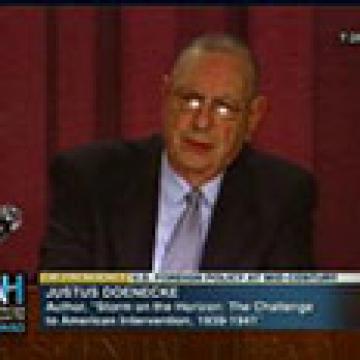James A. Garfield: Campaigns and Elections
The Campaign and Election of 1880:
President Rutherford B. Hayes had vowed to be a one-term President, and he kept his pledge. When Republicans convened in Chicago in June 1880, the fight for the nomination stood between former President Ulysses S. Grant, a Stalwart, and James G. Blaine, the Half-Breed senator from Maine. Garfield, head of the Ohio delegation and chairman of the Convention Rules Committee, backed Treasury Secretary John Sherman of Ohio, a veteran of both the House and the Senate. Though he bore the cross of dullness, Sherman might emerge as the ideal compromise candidate. Garfield nominated Sherman. The convention deadlocked through the next thirty-three ballots, with Grant leading, followed by Blaine and Sherman.
Throughout the convention balloting, Garfield had received one or two courtesy votes on each roll call. On the thirty-fourth ballot, Wisconsin cast sixteen votes for Garfield. On the next ballot, Garfield received fifty votes. The move became a stampede on the thirty-sixth ballot as the Blaine and Sherman forces rallied to the Ohio congressman, who had been elected by the Ohio state legislature to the U.S. Senate just prior to the Republican convention. Garfield won 399 votes to Grant's 306, putting him over the top and giving him the Republican nomination.
Conkling's friend and protege, Chester A. Arthur, former customs collector at the Port of New York, received the party's nomination for vice president with Garfield's endorsement. Conkling warned Arthur against accepting the slot, predicting Garfield's defeat and urging him to "drop it as you would a red hot shoe from the forge." Arthur responded that the "office of the Vice-President is a great honor than I ever dreamed of attaning." Arthur's nomination had been organized behind Garfield's back. Garfield reluctantly approved, knowing he needed Stalwart support to emerge victorious.
When Samuel J. Tilden, former New York governor and the Democratic nominee in 1876, withdrew his name from consideration, the Democrats nominated Winfield S. Hancock, a Civil War hero and career Army officer. Hancock had seen Civil War action at Antietam and Gettysburg, where he had blunted Pickett's Charge. He also fought in the Wilderness campaign and at a dozen other engagements as well. He served as the military governor of Louisiana and Texas during Reconstruction, running afoul of Radical Republicans when his policies supported whites and Democrats over blacks and carpetbaggers.
The presidential campaign revealed few differences between the candidates, except for the tariff. Hancock stumbled when he dismissed the tariff issue as "a local question." Democrats attacked Garfield for his part in the Credit Mobilier scandal. Following President Hayes's advice, Garfield kept a low profile during the campaign.
Since Garfield was, quite correctly, perceived as tied far more to the Half-Breeds than to the Stalwarts, he immediately realized that he had to mend political fences. On August 5, he met with party leaders, though not Conkling, in New York City. During an exchange of views, Garfield promised to recognize all party factions, including the Stalwarts, when presidential appointments were made. Though the terms were vague and ambiguous, pundits dubbed the conference the "Treaty of Fifth Avenue." Both Conkling and Garfield knew that the electoral votes in New York might well prove decisive in the election.
In one of the closest elections on record, Garfield beat Hancock by a mere 7,368 votes, less than one-tenth of one percent of the total votes cast. Taking such minor parties as the Greenbackers and Prohibitionists into account, Garfield received only 48.3 percent. His support was much stronger in the electoral college, where he received 214 votes to Hancock's 155. Each candidate carried nineteen states. Garfield won the northern and midwestern states while Hancock carried the South and most of the border states. Had New York gone Democratic, resulting in a shift of a few thousand votes in each state, Hancock would have won in the electoral college.
